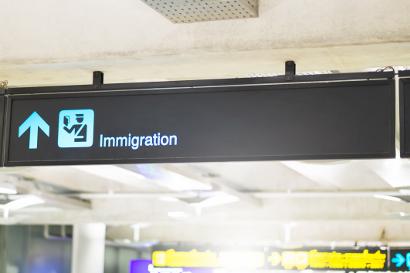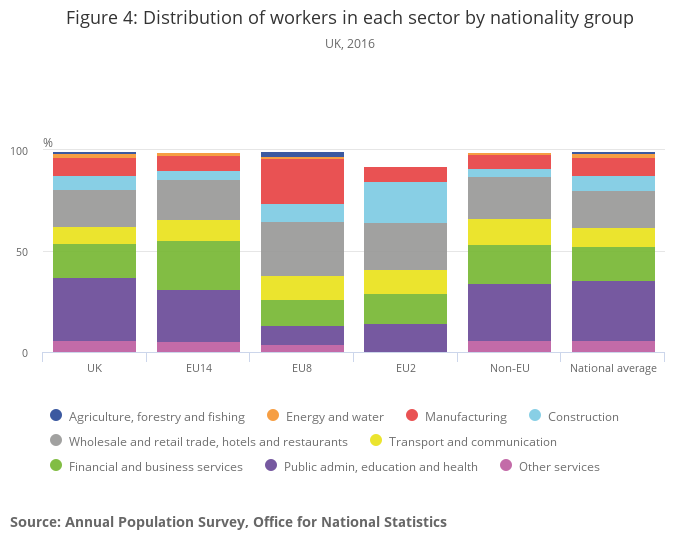Day 35, Year of #Mygration: One day without us

As politicians are struggling to identify the ‘will of the people’ tomorrow’s ‘One Day Without Us’ campaign is a needed reminder who the people are. One Day Without Us was first organised in 2017 as a response to immigration becoming a focus topic of public debate and political agenda. The campaigns built up an emotional atmosphere, embraced by politicians in their favour. The UK’s EU referendum vote seemed to be a turning point. It seemed to have open the door to the way anti-immigration views were publicly discussed, but also changed how perceived immigrants were treated and seems to have allowed for a rise in hate crimes.
You are loved. You are welcome. Your rights will be protected.
Boris Johnson
Foreign Secretary, Belvedere Forum on Polish-UK relations, 17th October 2017
While politicians have since been trying to do their bit to change the perceived public mood, One Day Without Us wanted to respond to this by celebrating migrants and migration in the UK. The grassroots movement is organised by ‘ordinary people from all walks of life’ without any specific party affiliation. One Day Without Us is a day to remember that borders are a political-legal creations enabling a nation-state structure. We, as individuals, should not be defined by them.
Migration is a forming characteristic of UK society. As heritance of the Empire, the UK even recognises various degrees of British citizenship, stemming from different categories of nationality. The ‘Commonwealth citizen’ is as well known a term as ‘British citizen’ and more so now the ‘European Union citizen’. Migration is so engrained in UK society, that the way it was dragged to the forefront of political debate before the UK’s referendum vote on EU membership was tantamount to an earthquake. If we were to define migration by simply looking at the number of non-British residents the political attention seems disproportionate: A mere 9% of the resident population in the UK have a non-British nationality.[1] 60% of these, around 3.6 Million, hold non-UK EU nationality. In comparison, 22.5% of the population in Germany hold non-German nationality. While the number of non-British residents in the UK is comparatively small, the contribution of those citizens is vital to the UK’s society, economy and culture, which politicians are starting to recognise.
We want people to stay and we want families to stay together. We hugely value the contributions that EU nationals make to the economic, social and cultural fabric of the UK.
Theresa May
Prime Minister, Open Letter to EU Citizens, 19th October 2017
If we were to take the health sector, and the NHS within it, as one example, we’d see that 202 nationalities are represented by those NHS (England) employees that declare a nationality. Most of them are British, followed by Indian (2nd), Philippinian (3rd) and Irish (4th), as first non-UK EU nationality. All in all 12.4% of people working within the NHS are declaring a non-British nationality. 10 % of registered doctors working for the NHS in the UK are non-UK EU citizens.

Figure 1: Distribution of workers in each sector by nationality
As the public debate shifted from an inclusive to an exclusive one, the defining role migration has played in the UK is at risk of becoming buried. Migration became a scapegoat, used to explain low wages, the NHS crisis and elitism. While the Home Office has a long track record of questionable decisions in relation to visa applications, the treatment and language regarding non-UK EU nationals residing in the UK resulted in a momentous shift: More EU citizens have been removed from the UK than ever before, and the number of non-UK EU citizens naturalising as British doubled in the year after the referendum.
ONE DAY WITHOUT US was born as a day “Celebrating Migrants. Celebrating Migration”. A reminder that this welcoming and inclusive society was starting to turn its back to those that made the UK society more diverse, contributed to its welfare and standing in the world.
The day without EU citizens carries a different date: 29th March 2019, the day free movement of EU citizens is currently envisaged to end in relation to the UK and its citizens. Should the government have its way, the UK will need to react swiftly for this particular ‘Day Without Us’, not to turn into a season without fruit, hospitals without staff, schools without teachers.
It is human nature to take the way we know the world for granted. We grow into the world as we know it, without questioning what formed the society that we are growing up to be a part of. Sometimes, we need a wakeup call. Particularly, when the world as we know it crumbles, as political agenda aims to force a shift in society.
Keep embracing diversity as a good, not fighting it as an evil.
 Written by Anne Wesemann, Lecturer in Law at the OU Law School. Her research focusses on European Union law as constitutional order, with a particular focus on European Union Citizenship. In the wider sense, she is interested in comparative research analysing the UK's constitutional and political framework in comparison to that of continental Europe, with a particular focus on Germany and how that impacts on the perception of EU law and politics.
Written by Anne Wesemann, Lecturer in Law at the OU Law School. Her research focusses on European Union law as constitutional order, with a particular focus on European Union Citizenship. In the wider sense, she is interested in comparative research analysing the UK's constitutional and political framework in comparison to that of continental Europe, with a particular focus on Germany and how that impacts on the perception of EU law and politics.
[1] According to the Office for National Statistics
Contact our news team
For all out of hours enquiries, please telephone +44 (0)7901 515891
Contact detailsNews & articles

The FUNdamentals: Why fun matters more than we think
In a world that feels increasingly serious and pressured, fun can seem like a guilty pleasure — something optional, even frivolous. But what if fun isn’t an add on at all? What if it’s essential?